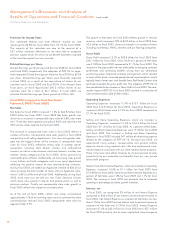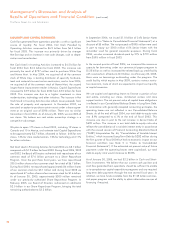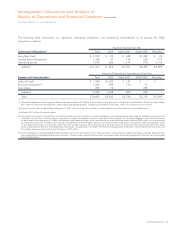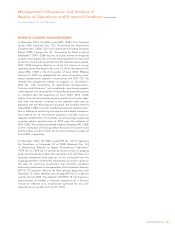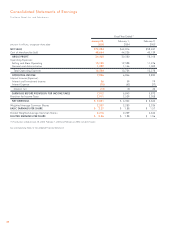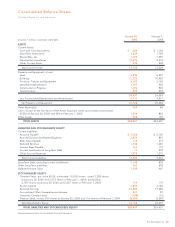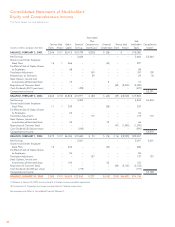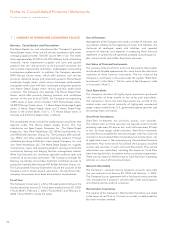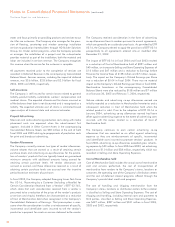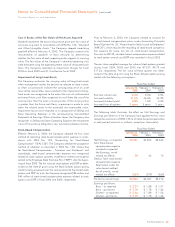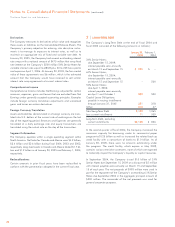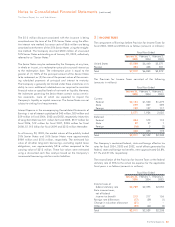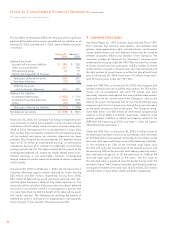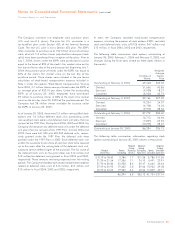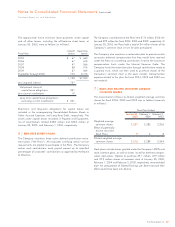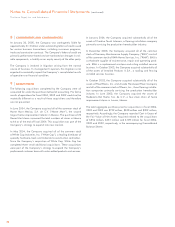Home Depot 2004 Annual Report Download - page 30
Download and view the complete annual report
Please find page 30 of the 2004 Home Depot annual report below. You can navigate through the pages in the report by either clicking on the pages listed below, or by using the keyword search tool below to find specific information within the annual report.
Notes to Consolidated Financial Statements
The Home Depot, Inc. and Subsidiaries
28
1|SUMMARY OF SIGNIFICANT ACCOUNTING POLICIES
Business, Consolidation and Presentation
The Home Depot, Inc. and subsidiaries (the “Company”) operate
Home Depot stores, which are full-service, warehouse-style stores
averaging approximately 106,000 square feet in size. The stores
stock approximately 40,000 to 50,000 different kinds of building
materials, home improvement supplies and lawn and garden
products that are sold primarily to do-it-yourself customers but
also to home improvement contractors, tradespeople and building
maintenance professionals. In addition, the Company operates
EXPO Design Center stores, which offer products and services
primarily related to design and renovation projects, Home Depot
Landscape Supply stores, which service landscape professionals
and garden enthusiasts with lawn, landscape and garden products
and Home Depot Supply stores serving primarily professional
customers. The Company also operates The Home Depot Floor
Stores, which offer primarily flooring products and installation
services. At the end of fiscal 2004, the Company was operating
1,890 stores in total, which included 1,657 Home Depot stores,
54 EXPO Design Center stores, 11 Home Depot Landscape Supply
stores, 5 Home Depot Supply stores and 2 Home Depot Floor
Stores in the United States (“U.S.”); 117 Home Depot stores in
Canada and 44 Home Depot stores in Mexico.
The consolidated results include five wholly-owned subsidiaries that
operate under The Home Depot Supply brand. The five
subsidiaries are Apex Supply Company, Inc., The Home Depot
Supply, Inc., Your Other Warehouse, LLC, White Cap Industries, Inc.
and HD Builder Solutions Group, Inc. The Company offers plumb-
ing, HVAC and other professional plumbing products through
wholesale plumbing distributors, Apex Supply Company, Inc. and
Your Other Warehouse, LLC. The Home Depot Supply, Inc. supplies
maintenance, repair and operating products serving primarily the
multi-family housing and lodging facilities management market.
White Cap Industries, Inc. distributes specialty hardware, tools and
materials to construction contractors. The Company arranges for
flooring, countertops and window treatment installation services to
production homebuilders through HD Builder Solutions Group, Inc.
The Consolidated Financial Statements include the accounts of the
Company and its wholly-owned subsidiaries. All significant inter-
company transactions have been eliminated in consolidation.
Fiscal Year
The Company’s fiscal year is a 52 or 53-week period ending on the
Sunday nearest to January 31. Fiscal years ended January 30, 2005
(“fiscal 2004”), February 1, 2004 (“fiscal 2003”) and February 2,
2003 (“fiscal 2002”) include 52 weeks.
Use of Estimates
Management of the Company has made a number of estimates and
assumptions relating to the reporting of assets and liabilities, the
disclosure of contingent assets and liabilities, and reported
amounts of revenues and expenses in preparing these financial
statements in conformity with generally accepted accounting princi-
ples. Actual results could differ from these estimates.
Fair Value of Financial Instruments
The carrying amounts of Cash and Cash Equivalents, Receivables
and Accounts Payable approximate fair value due to the short-term
maturities of these financial instruments. The fair value of the
Company’s investments is discussed under the caption “Short-Term
Investments” in this Note 1. The fair value of the Company’s debt
is discussed in Note 2.
Cash Equivalents
The Company considers all highly liquid investments purchased
with maturities of three months or less to be cash equivalents.
The Company’s Cash and Cash Equivalents are carried at fair
market value and consist primarily of high-grade commercial
paper, money market funds, U.S. government agency securities and
tax-exempt notes and bonds.
Short-Term Investments
Short-Term Investments are primarily auction rate securities.
The interest rates on these securities are typically reset to market
prevailing rates every 35 days or less, and in all cases every 90 days
or less, but have longer stated maturities. Short-Term Investments
are classified as available-for-sale and changes in the fair value are
included in Accumulated Other Comprehensive Income (Loss), net
of applicable taxes in the accompanying Consolidated Financial
Statements. Prior to the end of fiscal 2004, the Company classified
auction rate securities in Cash and Cash Equivalents. Prior period
information was reclassified, including the impact on Cash Flow
from Investing Activities, to conform to the current year presentation.
There was no impact on Net Earnings or Cash Flow from Operating
Activities as a result of the reclassification.
Accounts Receivable
The Company’s valuation reserve related to accounts receivable
was not material as of January 30, 2005 and February 1, 2004.
The Company has an agreement with a third-party service provider
who manages the Company’s private label credit card program
and directly extends credit to customers.
Merchandise Inventories
The majority of the Company’s Merchandise Inventories are stated
at the lower of cost (first-in, first-out) or market, as determined by
the retail inventory method.


